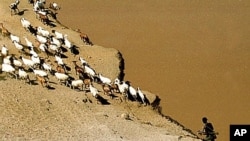London-based Minority Rights Group International (MRGI) has released a report detailing how minority groups in resource-scarce East Africa face major challenges over access to and control of natural resources.
According to MRGI, national and international companies are moving into East African areas traditionally occupied by minority communities, fueling competition for increasingly scarce resources and deepening longstanding animosities and conflicts between communities.
"Because you have had this influx of companies [and the subsequent] scramble for resources in Africa, many of them have found themselves specifically having to go to minority areas," says MRGI's Africa regional information officer Mohamed Matovu. "Already these are disputed lands because many of them are held in trust, others are communally owned by communities. So they seem to be no-man’s lands, but there are actually communities living here."
The report cites the example of Hell’s Gate National Park in Kenya, where the Maasai people lay traditional claim to the land. Several decades ago, a national energy company and farmers began moving into the area, affecting 20,000 Maasai.
The Maasai argue that power installations prevent them from using the pasture in the area to feed their cattle, their main source of livelihood. Conflicts between the Maasai and the newcomers continue today.
Another concern is ongoing construction of the Gilgel Gibe lll hydroelectric dam on Ethiopia's Omo River, a vital Lake Turkana tributary. A controversial project that critics describe as a severe threat to the indigenous population, its completion has been jeopardized by withdrawal of financial backers and a campaign of international opposition.
"River Omo is actually the major inlet into Lake Turkana," says pastoralist Abdullahi Dima, MRGI's expert in resource conflict management. "If this is going to be tapped for hydro-electric power ... you can just imagine the type of problem that will arise. We are in the era of climate change, [and] if Lake Turkana, this whole huge resource, is going to dry up, this has a direct bearing on the lives and the livelihoods of the communities around this region."
Dima predicts that the Turkana and Merille minority groups in the area, both of whom rely on herding as their primary economic activity, will carry out more attacks against one another as they struggle to get water for their cattle.
The organization defines “minority groups” as being disadvantaged ethnic, national, religious, linguistic or cultural communities smaller in number than the rest of the population, wishing to maintain their identity.
In East Africa, these are typically herders and other indigenous people. Examples include the Olkaria Maasai in Kenya, the Karamojong in Uganda and the Dinka Bor in South Sudan.
The report says that, although the minority groups differ in size, location and livelihood, they all face similar challenges: diminishing natural resources, insecurity, and discrimination from the wider society.
Report: E. African Minorities Losing Resources




